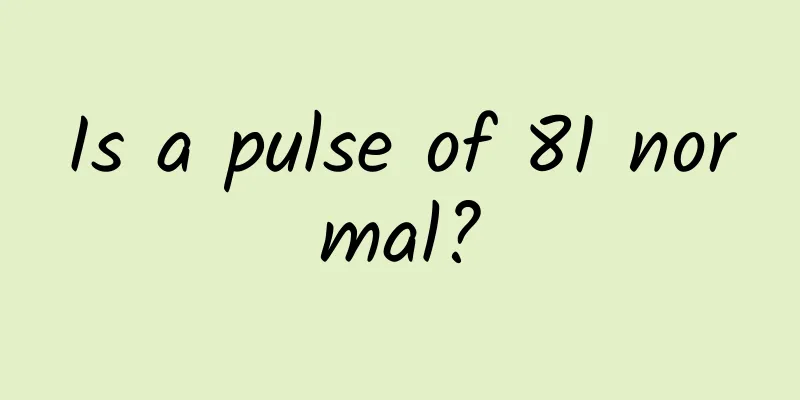Is a pulse of 81 normal?

|
Generally speaking, a normal person's heart rate is 60-100. A heart rate of 81 is generally normal, so you don't have to worry too much. If you have chest pain, you must check it out in time. The heart is the most important part of the human body. You must protect your heart at ordinary times so that you can live a long life. There are many reasons that affect abnormal heart rate. You must avoid extreme joy and sorrow, and excessive emotional excitement. Heart rate refers to the number of heartbeats per minute in a normal person's quiet state, also called resting heart rate. It is generally 60 to 100 beats per minute, and may vary from person to person due to age, gender or other physiological factors. Generally speaking, the younger the age, the faster the heart rate. The elderly have a slower heart rate than the young, and women have a faster heart rate than men of the same age. These are all normal physiological phenomena. In a resting state, the normal heart rate for adults is 60 to 100 beats per minute, and the ideal heart rate should be 55 to 70 beats per minute (the heart rate of athletes is slower than that of ordinary adults, generally around 50 beats per minute). Heart rate changes are closely related to heart disease. If the heart rate exceeds 160 beats/minute, or is lower than 40 beats/minute, it is mostly seen in patients with heart disease. If it is often accompanied by palpitations, chest tightness and other discomforts, a detailed examination should be carried out as soon as possible so that treatment can be targeted at the cause. 1. Tachycardia: When an adult's heart rate exceeds 100 beats/minute (generally not more than 160 beats/minute) at rest, it is called sinus tachycardia. It is common in people who are excited, agitated, smoke, drink alcohol, drink strong tea or coffee, or in pathological conditions such as infection, fever, shock, anemia, hypoxia, hyperthyroidism, heart failure, or after the use of drugs such as atropine, epinephrine, and ephedrine. 2. Bradycardia: When an adult's heart rate is lower than 60 beats/minute at rest (generally above 45 beats/minute), it is called sinus bradycardia. It can be seen in healthy people and athletes who engage in heavy physical labor for a long time; or in hypothyroidism, increased intracranial pressure, obstructive jaundice, and overdose of digitalis, quinidine or propranolol. If the heart rate is lower than 40 beats/minute, sick sinus syndrome, atrioventricular block, etc. should be considered. If the pulse is unequal and irregular and the pulse rate is less than the heart rate, atrial fibrillation should be considered. 3. Correctly view sinus bradycardia. Many people will experience sinus bradycardia with irregularity. This is normal for most people and there is no need to worry too much. Sinus bradycardia refers to a person with a heart rate of less than 60 beats per minute. Whether this symptom will occur depends on the frequency of the bradycardia and the cause of the bradycardia. When in a resting state, an adult's heart rate will generally not show obvious symptoms if it is between 50 and 60 beats per minute. Especially some well-trained athletes and people who engage in physical labor for a long time will not show obvious symptoms even if their heart rate is around 40 beats/minute in a quiet state. However, if the average person's heart rate is between 40 and 50 beats per minute, they will experience symptoms such as chest tightness, fatigue, and dizziness. If the heart rate drops to 35 to 40 beats per minute, hemodynamic changes will occur, affecting the blood supply to the heart and brain, resulting in chest tightness, dizziness, syncope, and even sudden death. If you do not feel any discomfort, you do not need to pay attention to the "sinus bradycardia with irregularity" mentioned in the electrocardiogram. However, if you experience symptoms such as chest tightness, fatigue, dizziness, etc., you should go to the hospital immediately for further examination, such as dynamic electrocardiogram, cardiac color ultrasound, etc., to understand the cause of bradycardia. If the heartbeat is too slow, a pacemaker can be installed to relieve the symptoms and improve the prognosis. An increased heart rate harms health, shortens life expectancy, and increases the incidence and mortality of cardiovascular diseases. How to keep your resting heart rate at around 60 beats per minute: 1. Exercise: Regularly participating in various exercises of appropriate intensity will slow down your resting heart rate. Although the heart rate increases during exercise, exercise can exercise the heart function and thus slow down the resting heart rate. The generally appropriate exercise heart rate is "170-age". For example, for a 50-year-old person, the exercise heart rate should be controlled at 120 beats/minute. A heart rate that is too fast means that the amount of exercise is too much, which will not achieve the desired effect. You should feel comfortable and not tired before exercising. Generally, exercise should not exceed 1 hour, and the best time each time is 30 to 60 minutes. Exercise at least 3 times a week. 2. Correct bad lifestyles. Staying up late, smoking, and drinking can all increase your resting heart rate. Drink less strong tea, especially not before going to bed, otherwise it can easily lead to insomnia. You should also have regular bowel movements to keep bowel movements smooth. 3. Maintain a proper weight. Obesity will increase the burden on the heart and increase the heart rate. Therefore, obese people should maintain a proper weight through fitness exercises and adjusting their diet. 4. Maintain a calm mind. Keep a calm mind in life. Don’t always be anxious or angry. If your heart rate is too fast due to tension, anger, etc., you can gradually calm down by listening to music, meditating, etc. 5. Drug treatment can be used to treat certain diseases such as hypertension and coronary heart disease that cause an accelerated heart rate. You can take medication according to the doctor's instructions to slow down the heart rate, protect the heart, reduce and control myocardial ischemia events, improve heart function, and prolong life. |
>>: Are canned yellow peaches cool in nature?
Recommend
How long does it take to survive small cell lung cancer?
Small cell lung cancer is also a small part of lu...
What to do if you have a cold and no medicine
If you catch a cold suddenly and there is no medi...
What department should I go to for anal itching
The anus is an essential organ for normal bowel m...
What to do if you have abdominal distension and pain during menstruation?
Many women always feel uncomfortable during their...
Symptoms of enteritis
In many cases, enteritis is caused by some bacter...
Huangjing is suitable for people
The medicinal material Polygonatum sibiricum come...
How long does a closed needle last? What are the differences between long-acting and short-acting drugs?
A blocking injection is a procedure in which some...
Chinese Medicine Chiropractic
Nowadays, many people have various bone problems ...
What medicine can cure genital herpes quickly? What is effective for herpes?
Genital herpes is mainly caused by herpes simplex...
Early symptoms of AIDS
Even today when medical technology is so advanced...
What to do if your ears are thick
The ear is a very important part of the human bod...
What are the effects of hawthorn? What are the benefits of eating hawthorn
Hawthorn is a very healthy food with high health ...
What causes dull pain in left groin?
There is inflammation and pain in the left groin....
What causes burning sensation in the calves
Some people often feel a burning sensation in the...
Tuberculosis has no symptoms
I believe that everyone must be very scared when ...









